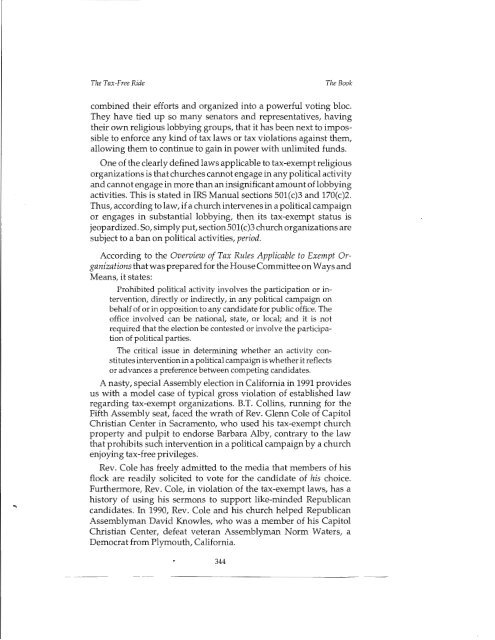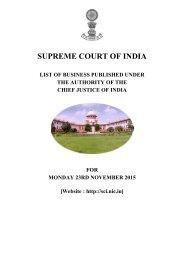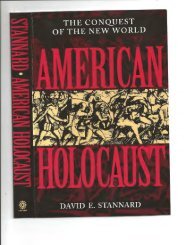- Page 2 and 3:
"For reference, shock, or lively de
- Page 4 and 5:
Editor: Technical Editor: Product D
- Page 6 and 7:
Go forth, my book, and take whateve
- Page 8 and 9:
The Book sets its tone with Robert
- Page 10 and 11:
Soviet Union. Arabs of one religion
- Page 12 and 13:
Some who rightly reject this conclu
- Page 14 and 15:
Dead Sea Scrolls Astrology in the D
- Page 16 and 17:
The Secret Gospel, by Morton Smith
- Page 18 and 19:
Dr. Jesus And His Degreed Disciples
- Page 20 and 21:
~ William Lewis Edelen Bill, with y
- Page 22 and 23:
Religious Illiteracy The Book Petra
- Page 24 and 25:
Zoroaster Zarathustra is the old Ir
- Page 26 and 27:
Zoroastrianism: Blueprint For Chris
- Page 28 and 29:
Zoroastrianism: Blueprint For Chris
- Page 30 and 31:
.Horus A Major Egyptian God 12
- Page 32 and 33:
Horus: The Way, The Truth, The Life
- Page 34 and 35:
Horus: The Way, The Truth, The Life
- Page 36 and 37:
Ancient Pagan Cross Showing the Rou
- Page 38 and 39:
Astra-Theology The Book · Any evol
- Page 40 and 41:
God's Sun, The Light of the World,
- Page 42 and 43:
Pictured here is the original conce
- Page 45:
The Book Astra-Theology King James
- Page 48 and 49:
Pharaoh with His Rod + Staff First
- Page 50 and 51:
Reason and free inquiry are the onl
- Page 52 and 53:
Reason And Religion The Book to kno
- Page 54 and 55:
Ayatollah Khomeini The late leader
- Page 56 and 57:
Islam The Book Mohammed Mohammed wa
- Page 58 and 59:
Islam The Book Salman Rushdie "To b
- Page 60 and 61:
The Star of David originally appear
- Page 62 and 63:
Jewish Humanism The Book Nathan Rot
- Page 64 and 65:
Jewish Humanism The Book Hillel, bu
- Page 66 and 67:
jewish Humanism The Book Equal Time
- Page 68 and 69:
Jewish Humanism The Book The Secula
- Page 70 and 71:
False Messiahs, Saints and Saviors
- Page 72 and 73:
False Messiahs, Saints and Saviors
- Page 74 and 75:
Kanati The Great Hunter, First Cher
- Page 76 and 77:
Chief Seattle Speaks The Book We kn
- Page 78 and 79:
Comment on Chief Seattle's Speech I
- Page 80 and 81:
Calendar of The Zodiac The basis fo
- Page 82 and 83:
Astrology In The Dead Sea Scrolls T
- Page 84 and 85:
Astrology In The Dead Sea Scrolls T
- Page 86 and 87:
Robert Eisenman And The "Last Revel
- Page 88 and 89:
,...,_ . ._,;,...,;, L ~+.::l "M. .
- Page 90 and 91:
QUMRAN AND THE DEAD SEA ' i I •,
- Page 92 and 93:
Horoscopes Two documents of the Dea
- Page 94 and 95:
Gideon Exposed! The Gideon Society
- Page 96 and 97:
Must We Bash The Bible? The Book Sp
- Page 98 and 99:
Of all the tyrannies that affect ma
- Page 100 and 101:
The Age of Reason The Book the Prot
- Page 102 and 103:
The Age of Reason The Book a man, a
- Page 104 and 105:
The Age of Reason The Book that acc
- Page 106 and 107:
88 English Version
- Page 108 and 109:
A Brief History OfThe English Bible
- Page 110 and 111:
A Brief History Of The English Bibl
- Page 112 and 113:
A Brief History Of The English Bibl
- Page 114 and 115:
Inspired Words of God Question: Can
- Page 116 and 117:
Nonexistent Prophecies: A Problem F
- Page 118 and 119:
0 ye of little faith ... -Jesus of
- Page 120 and 121:
Which way to the Ark? ~"·· - ---
- Page 122 and 123:
Noah's Flood As Composite Literatur
- Page 124 and 125:
Noah's Flood As Composite Literatur
- Page 126 and 127:
Noah's Flood As Composite Literatur
- Page 128 and 129:
If we affirm that God does not exis
- Page 130 and 131:
Bible Morality The Book • If any
- Page 132 and 133:
Bible Morality The Book Who was Chr
- Page 134 and 135:
Inerrancy I (I)nspirati;bn was comp
- Page 136 and 137:
Rescuing The Bible From Fundamental
- Page 138 and 139:
THE HOLY BIBLE, C onf91lmllhc0Jd Tc
- Page 140 and 141:
Destructive Divines The Book the me
- Page 142 and 143:
Destructive Divines The Book The ch
- Page 144 and 145:
Destructive Divines The Book Eschat
- Page 146 and 147:
Destructive Divines The Book summed
- Page 148 and 149:
Zeus and Jesus Zeus: Greek form of
- Page 150 and 151:
132
- Page 152 and 153:
The World's Sixteen Crucified Savio
- Page 154 and 155:
The World's Sixteen Crucified Savio
- Page 156 and 157:
The World's Sixteen Crucified Savio
- Page 158 and 159:
This 6th-century representation of
- Page 160 and 161:
Jesus: The Aramaic- Speaking Shemit
- Page 162 and 163:
Jesus: The Aramaic- Speaking Shemit
- Page 164 and 165:
Jesus: The Aramaic- Speaking Shemit
- Page 166 and 167:
Jesus: The Aramaic- Speaking Shemit
- Page 168 and 169:
Jesus: The Aramaic- Speaking Shemit
- Page 170 and 171:
The Last Supper This famous paintin
- Page 172 and 173:
The Last Supper The Book disappoint
- Page 174 and 175:
THERE IS NO EVIDENCE ... That Jesus
- Page 176 and 177:
Locating Jesus In Time, Space And A
- Page 178 and 179:
Locating Jesus In Time, Space And A
- Page 180 and 181:
Locating Jesus In Time, Space And A
- Page 182 and 183:
Locating Jesus In Time, Space And A
- Page 184 and 185:
Locating Jesus In Time, Space And A
- Page 186 and 187:
Ernest Renan Scholar and skeptic, w
- Page 188 and 189:
The Christ The Book Renan himself r
- Page 190 and 191:
The Christ The Book lived and taugh
- Page 192 and 193:
Christ the Bridegroom As Christ in
- Page 194 and 195:
The Secret Gospel The Book gospel i
- Page 196 and 197:
Mary The oldest story in the world
- Page 198 and 199:
This ancient story of the Virgin Mo
- Page 200 and 201:
Christmas Surprise The Book There c
- Page 202 and 203:
Christmas Surprise The Book It is a
- Page 204 and 205:
Christ In Glory Virgo the Virgin we
- Page 206 and 207:
Probing The Mystery Of Jesus' Secon
- Page 208 and 209:
Probing The Mystery Of Jesus' Secon
- Page 210 and 211:
Trinity The First Atomic Bomb, call
- Page 212 and 213:
The End(s) The Book 1966- "Six thou
- Page 214 and 215:
The Cross The Pagan and Christian u
- Page 216 and 217:
At first, Christianity did not hold
- Page 218 and 219:
As far back as we can go into the a
- Page 220 and 221:
-After Jesus The Triumph of Christi
- Page 222 and 223:
Paul: First Christian Heretic The B
- Page 224 and 225:
\ \ / \ / ; ' \/ Do ~u Believe In S
- Page 226 and 227:
"E-V-1-L" personified became the "D
- Page 228 and 229:
But of the tree of the knowledge of
- Page 230 and 231:
Original Sin The Book For those who
- Page 232 and 233:
Original Sin The Book .., are signi
- Page 234 and 235:
Original Sin The Book .., family, b
- Page 236 and 237:
The ''Impaled'' Savior Facts, ficti
- Page 238 and 239:
The Resurrection: What Is The Evide
- Page 240 and 241:
..., · Angels and the Tomb So-call
- Page 242 and 243:
No Stone Unturned The Book .., my d
- Page 244 and 245:
No Stone Unturned The Book .., I am
- Page 246 and 247:
.., Mushroom The early "Psilocybe C
- Page 248 and 249:
The Book The High Priest · rites b
- Page 250 and 251:
The Book The High Priest of God," i
- Page 252 and 253:
The Book The High Priest Baptism In
- Page 254 and 255:
The Constantine Cross In this sign
- Page 256 and 257:
Blood On The Ground, Churches All A
- Page 258 and 259:
Blood On The Ground, Churches All A
- Page 260 and 261:
WAR It was Po~ Url;>an II who inaug
- Page 262 and 263:
J t Pope Paul VI pressured Presiden
- Page 264 and 265:
Europe Decays And The Popes Thrive
- Page 266 and 267:
Europe Decays And The Popes Thrive
- Page 268 and 269:
Europe Decays And The Popes Thrive
- Page 270 and 271:
Europe Decays And The Popes Thrive
- Page 272 and 273:
The Puritan Theocracy: In the New E
- Page 274 and 275:
Hermes Vs. Puritans The Book mation
- Page 276 and 277:
Hermes Vs. Puritans The Book ..., t
- Page 278 and 279:
Hermes Vs. Puritans The Book benefi
- Page 280 and 281:
Hermes Vs. Puritans The Book A prom
- Page 282 and 283:
Hermes Vs. Puritans The Book Conser
- Page 284 and 285:
.., From Petra/ Majorca he came to
- Page 286 and 287:
Father Serra And The Mission Tree T
- Page 288 and 289:
Father Serra And The Mission Tree T
- Page 290 and 291:
Father Serra And The Mission Tree T
- Page 292 and 293:
Father Serra And The Mission Tree T
- Page 294 and 295:
Father Serra And The Mission Tree T
- Page 296 and 297:
Missionaries I shall give thee the
- Page 298 and 299:
E.T. a Catholic? Steve Yozwiak, Ari
- Page 300 and 301:
DON'T LET THEM GET AWAY WITH IT! Ph
- Page 302 and 303:
The Book The Religious Right's Marc
- Page 304 and 305:
The Book The Religious Right's Marc
- Page 306 and 307:
The Book The Religious Right's Marc
- Page 308 and 309:
The Book The Religious Right's Marc
- Page 310 and 311: The Book In January, Vice-President
- Page 312 and 313: Born-Again Student Meets Secular Pr
- Page 314 and 315: Born-Again Student Meets Secular Pr
- Page 316 and 317: Born-Again Student Meets Secular Pr
- Page 318 and 319: Born-Again Student Meets Secular Pr
- Page 320 and 321: Satan knows Jesus Christ is about t
- Page 322 and 323: Armageddon The Book way or another,
- Page 324 and 325: Armageddon The Book believe, that w
- Page 326 and 327: Dr. John Lightfoot, one of the most
- Page 328 and 329: Three Cheers For The Creationists!
- Page 330 and 331: Three Cheers For The Creationists!
- Page 332 and 333: Killing Darwin for Christ Lawrence
- Page 334 and 335: The Book Killing Darwin for Christ
- Page 336 and 337: The Book Killing Darwin for Christ
- Page 338 and 339: The Book Killing Darwin for Christ
- Page 340 and 341: The Book Killing Darwin for Christ
- Page 342 and 343: The Book Killing Darwin for Christ
- Page 344 and 345: Church & Society .., 327
- Page 346 and 347: Church-State Separation: Endangered
- Page 348 and 349: The Book Church-State Separation: E
- Page 350 and 351: The Book Church-State Separation: E
- Page 352 and 353: The Book Church-State Separation: E
- Page 354 and 355: The Book Church-State Separation: E
- Page 356 and 357: The Book Church-State Separation: E
- Page 358 and 359: The Tax-Free Ride A us tin Miles As
- Page 362 and 363: The Book The Tax-Free Ride Rev. Col
- Page 364 and 365: The Book The Tax-Free Ride The CIA-
- Page 366 and 367: The Book The Tax-Free Ride in order
- Page 368 and 369: Honey, They Cut The Kid! Religious
- Page 370 and 371: The Book Honey, They Cut The Kid! g
- Page 372 and 373: The Book Female Genital Mutilation
- Page 374 and 375: The Book Female Genital Mutilation
- Page 376 and 377: Woman's Right Steve Allen It is fas
- Page 378 and 379: The Book Woman's Right According to
- Page 380 and 381: The Book Woman's Right Father Burtc
- Page 382 and 383: The Book Woman's Right ..., ly bein
- Page 384 and 385: Sexual Child Abuse In The Church An
- Page 386 and 387: The Book Sexual Child Abuse In The
- Page 388 and 389: The Book Sexual Child Abuse In The
- Page 390 and 391: The Book Sexual Child Abuse In The
- Page 392 and 393: The Book Sexual Child Abuse In The
- Page 394 and 395: The Secret Sins Of The Sanctuary Ar
- Page 396 and 397: The Book The Secret Sins Of The San
- Page 398 and 399: The Book The Secret Sins OJ The San
- Page 400 and 401: Woman Robert Green Ingersoll In the
- Page 402 and 403: The Book Woman No woman should be f
- Page 405 and 406: ~Ian ~lbert ~now ~afri"'l oaliofa.e
- Page 407 and 408: The Book Dr. Jesus and His Degreed
- Page 409 and 410: The Book Dr. Jesus and His Degreed
- Page 411 and 412:
~ ~~~ ~ ~ ~ ~ ~~~ ~~ ~~ _L. . _L t,
- Page 413 and 414:
The Book ..., Islam . . . . . . . .
- Page 415 and 416:
The Book Battlelines Being Drawn ..
- Page 417 and 418:
400 James Madison
- Page 419 and 420:
Celebrating the World Day of Prayer
- Page 421 and 422:
Independence From Authority The Boo
- Page 423 and 424:
Independence From Authority The Boo
- Page 425 and 426:
Independence From Authority The Boo
- Page 427 and 428:
Independence From Authority The Boo
- Page 429 and 430:
I believe in the fireside. I believ
- Page 431 and 432:
BANNED BOOK WEEK 1992 C E N S 0 R S
- Page 433 and 434:
{ Truth Seeker In The Trenches The
- Page 435 and 436:
Truth Seeker In The Trenches The Bo
- Page 437 and 438:
Freethought on Trial .., The Spanis
- Page 439 and 440:
In 1428, forty-four years after his
- Page 441 and 442:
Life As A Freethinker The Book reli
- Page 443 and 444:
Life As A Freethinker The Book ...,
- Page 445 and 446:
Un Autre Monde Painting of the nigh
- Page 447 and 448:
What Is To Be The New Mythology? Th
- Page 449 and 450:
Off With His Head! An edited view o
- Page 451 and 452:
Partial List Of Freethinkers The Bo
- Page 453 and 454:
Partial List Of Freethinkers Thomas
- Page 455 and 456:
Partial List OJ Freethinkers Michae
- Page 457 and 458:
Freethought Terms The Book Faith: 1
- Page 459 and 460:
Freethought Terms The Book whether
- Page 461 and 462:
Illustrations And Photos The Book T
- Page 463:
What do the following have in commo





